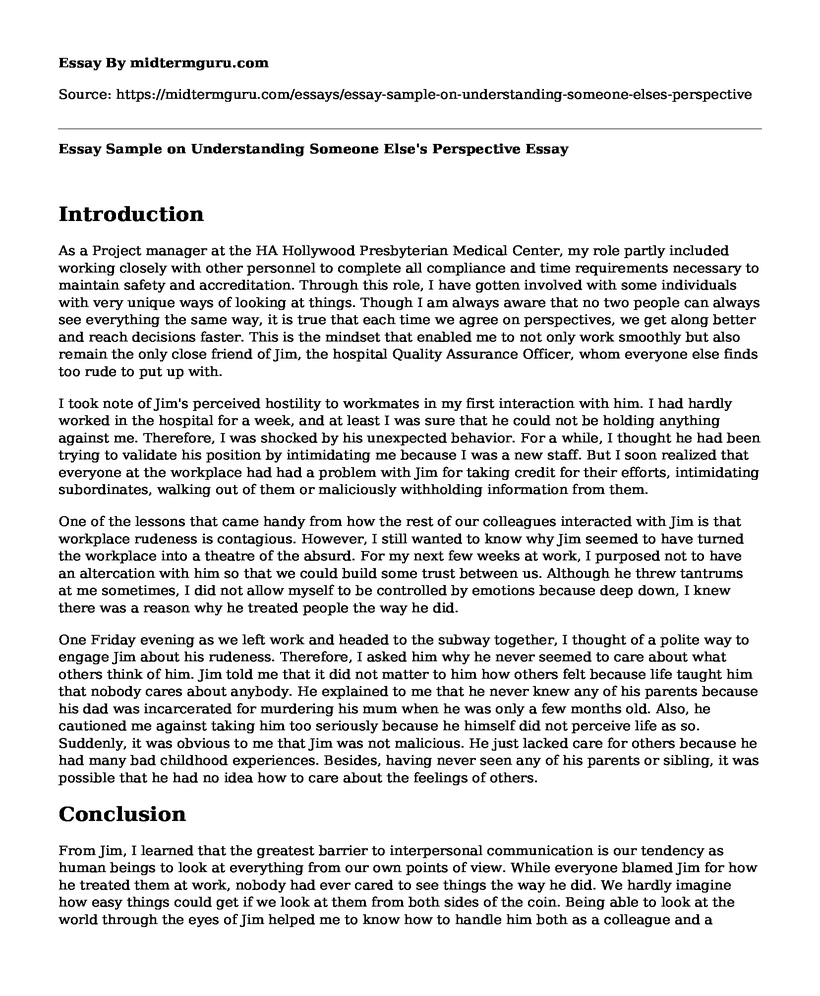Introduction
As a Project manager at the HA Hollywood Presbyterian Medical Center, my role partly included working closely with other personnel to complete all compliance and time requirements necessary to maintain safety and accreditation. Through this role, I have gotten involved with some individuals with very unique ways of looking at things. Though I am always aware that no two people can always see everything the same way, it is true that each time we agree on perspectives, we get along better and reach decisions faster. This is the mindset that enabled me to not only work smoothly but also remain the only close friend of Jim, the hospital Quality Assurance Officer, whom everyone else finds too rude to put up with.
I took note of Jim's perceived hostility to workmates in my first interaction with him. I had hardly worked in the hospital for a week, and at least I was sure that he could not be holding anything against me. Therefore, I was shocked by his unexpected behavior. For a while, I thought he had been trying to validate his position by intimidating me because I was a new staff. But I soon realized that everyone at the workplace had had a problem with Jim for taking credit for their efforts, intimidating subordinates, walking out of them or maliciously withholding information from them.
One of the lessons that came handy from how the rest of our colleagues interacted with Jim is that workplace rudeness is contagious. However, I still wanted to know why Jim seemed to have turned the workplace into a theatre of the absurd. For my next few weeks at work, I purposed not to have an altercation with him so that we could build some trust between us. Although he threw tantrums at me sometimes, I did not allow myself to be controlled by emotions because deep down, I knew there was a reason why he treated people the way he did.
One Friday evening as we left work and headed to the subway together, I thought of a polite way to engage Jim about his rudeness. Therefore, I asked him why he never seemed to care about what others think of him. Jim told me that it did not matter to him how others felt because life taught him that nobody cares about anybody. He explained to me that he never knew any of his parents because his dad was incarcerated for murdering his mum when he was only a few months old. Also, he cautioned me against taking him too seriously because he himself did not perceive life as so. Suddenly, it was obvious to me that Jim was not malicious. He just lacked care for others because he had many bad childhood experiences. Besides, having never seen any of his parents or sibling, it was possible that he had no idea how to care about the feelings of others.
Conclusion
From Jim, I learned that the greatest barrier to interpersonal communication is our tendency as human beings to look at everything from our own points of view. While everyone blamed Jim for how he treated them at work, nobody had ever cared to see things the way he did. We hardly imagine how easy things could get if we look at them from both sides of the coin. Being able to look at the world through the eyes of Jim helped me to know how to handle him both as a colleague and a friend.
Cite this page
Essay Sample on Understanding Someone Else's Perspective. (2022, Sep 14). Retrieved from https://midtermguru.com/essays/essay-sample-on-understanding-someone-elses-perspective
If you are the original author of this essay and no longer wish to have it published on the midtermguru.com website, please click below to request its removal:
- Essay on Culture of Competitiveness According to Gordon Lankton
- Essay on Management Example: Managing Organizational Change as a Method of Planning
- Improvement of Safety of the Water Sources With Examples - Ecology Paper Example
- Paper Example on Traits Employees Look For From Their Leaders
- Business Decision Making - Essay Sample
- Organizational Culture & Performance - Essay Sample
- Leadership Techniques for Enhancing Employee Commitment - Essay Sample







